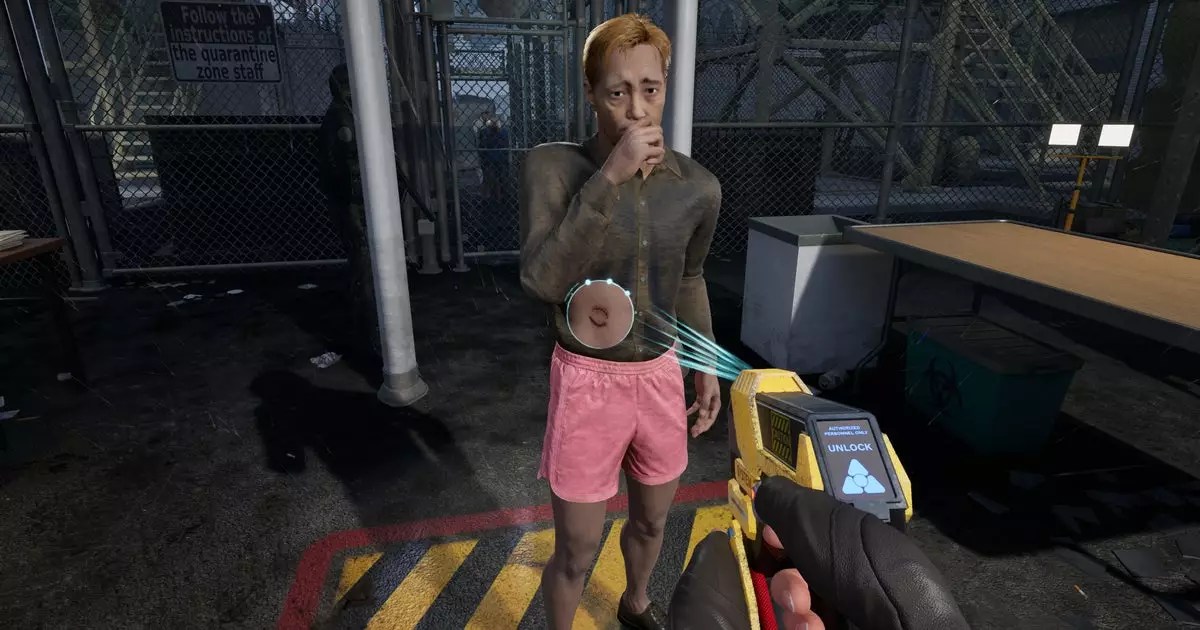In the bleak landscape of the recent game “Quarantine Zone: The Last Check,” players are thrust into a moral crucible where every decision carries weighty consequences. Playing as a government checkpoint guard in a zombie-infested wasteland, the core mechanic revolves around scrutinizing refugees for signs of infection—an act that is as ethically murky as it is procedurally intense. This simulation doesn’t merely test players’ resourcefulness but profoundly challenges their moral compass, revealing uncomfortable truths about human judgment under pressure. As we evaluate this experience, it becomes evident that the game acts as a mirror to real-world dilemmas—how much are we willing to sacrifice in the name of security, and what does it truly mean to uphold humanity amidst chaos?
The game’s mechanics emphasize meticulous inspection using various tools—UV lights, thermometers, and scanners—embodying the real-world complexity of border security measures. These tools symbolize the fragile line between safety and prejudice, hygiene and hysteria. Players must decide whether to quarantine, deny, or permit passage, often relying on ambiguous clues rather than concrete evidence. This mirrors contemporary debates about immigration, health protocols, and national security, prompting players to confront biases and instinctual fears. The game explicitly refuses to offer clear-cut answers, instead immersing players in morally ambiguous situations that question whether the ends justify the means.
Moreover, resource management heightens the tension. Limited test kits and personnel force strategic prioritization—do you spend precious supplies on a seemingly healthy individual or a visibly ill one? This scarcity factor simulates real-world dilemmas faced by frontline workers and officials, emphasizing that every decision involves trade-offs. It invites players to reflect on whether efficiency sometimes trumps compassion and whether such trade-offs are justifiable in the most extreme circumstances. The game’s design implicitly critiques societal structures where fear and survival instincts override moral consistency, challenging players to consider how far they are willing to go to preserve their community.
The Illusion of Control and the Threat of Chaos
As the game progresses, the pressure intensifies with increasing waves of zombies and mounting social unrest. This dynamic introduces a chaotic element that underscores a brutal truth: in survival scenarios, order is fragile and morality is often sacrificed at the altar of necessity. The game’s wave-based zombie attacks serve as a metaphor for societal breakdowns, revealing how quickly humanity’s veneer can peel away under stress. Foremen must bolster defenses, allocate scarce resources, and make life-and-death judgments—an ordeal that exposes not only their strategic acumen but their internal moral landscape.
Perhaps most compelling is the game’s underlying commentary on authority and trust. In a world teetering on moral collapse, leaders are forced to navigate skepticism, misinformation, and fear-mongering. The seemingly simple act of processing a refugee’s paperwork becomes a philosophical battleground: do we treat everyone with suspicion, or do we cling to some semblance of innocent trust? This tension raises deeper questions about the nature of justice and the importance of empathy, even in the direst situations. The simulation thus becomes more than a game—it is a provocative exploration of what it means to sustain civility amid chaos.
Interestingly, the game refrains from overt political commentary, focusing instead on universal themes that resonate across various societal contexts. It invites players to reflect on their own morality, biases, and capacity for empathy when faced with fears of infection or infiltration. In doing so, “Quarantine Zone” balances entertainment with an unsettling mirror held up to our collective conscience, forcing us to confront uncomfortable truths about human nature and societal priorities.
A Reflection of Humanity’s Resilience and Fallibility
What makes “Quarantine Zone” truly impactful is its refusal to reduce morality to black-and-white terms. Instead, it seeks to reveal the gray areas in which human beings often operate, especially under duress. Each decision to quarantine, accept, or deny represents choices that mirror real-life dilemmas—sometimes compassionate, sometimes pragmatic, and frequently conflicted. This layered approach encourages players to question whether they are operating with integrity, or if fear has simply blinded them to their own humanity.
Furthermore, the game’s atmosphere—dark, tense, and fraught with danger—serves as a reminder that moral resilience is just as vital as physical defenses. It shows that survival isn’t solely dependent on barricades and weaponry but on the moral clarity and integrity that sustain a community’s soul. The paradox of such a brutal setting lying at the heart of a compelling moral critique underscores that human resilience is multifaceted: it involves protecting oneself, but also maintaining the ethical fabric that binds society together.
In the end, “Quarantine Zone” challenges players to realize that morality is not inherent or static but a constant negotiation amidst adversity. It makes you ask: what are you willing to sacrifice, and where do you draw the line? The power of this simulation lies in its ability to provoke introspection while providing an intense, visceral experience of survival—showing that true strength resides not just in resilience, but in the moral choices that define our humanity, even in the face of apocalypse.


Leave a Reply